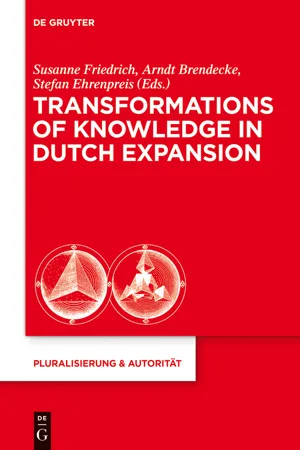
Transformations of Knowledge in Dutch Expansion
- 262 pages
- English
- ePUB (mobile friendly)
- Available on iOS & Android
Transformations of Knowledge in Dutch Expansion
About This Book
In the seventeenth and eighteenth centuries, objects, texts and people travelled around the world on board Dutch ships. The essays in this book explore how these circulations transformed knowledge in Asian and European societies. They concentrate on epistemic consequences in the fields of historiography, geography, natural history, religion and philosophy, as well as in everyday life. Emphasizing transformations, the volume reconstructs small semantic shifts of knowledge and tentative adjustments to new cultural contexts. It unfolds the often conflict-ridden, complex and largely global history of specific pieces of knowledge as well as of generally-shared contemporary understandings regarding what could or could not be considered true. The book contributes to current debates about how to conceptualize the unsettled epistemologies of the early modern world.
Frequently asked questions
Information
Endnotes
Table of contents
- Cover
- Title
- Copyright
- Contents
- Arndt Brendecke and Susanne Friedrich: Introduction
- Lissa Roberts: Re-Orienting the Transformation of Knowledge in Dutch Expansion: Nagasaki as a Centre of Accumulation and Management
- Mina Ishizu and Simona Valeriani: Botanical Knowledge in Early Modern Japan and Europe: Transformations and Parallel Developments
- Stefan Ehrenpreis: Empiricism and Image-Building: The Creation and Dissemination of Knowledge on Dutch Brazil 1636–1750
- Michiel van Groesen: Arnoldus Montanus, Dutch Brazil, and the Re-Emergence of Cannibalism
- Benjamin Schmidt: Knowledge Products and their Transmediations: Dutch Geography and the Transformation of the World
- Anke Fischer-Kattner: Transformations and Transformativity of Knowledge: François Le Vaillant’s Travelogues from the Dutch Cape Colony
- Anjana Singh: Botanical Knowledge in Early Modern Malabar and the Netherlands: A Review of Van Reede’s Hortus Malabaricus
- Bettina Noak: Under the Spell of Curiositas: Wouter Schouten (1638–1704) as Ethnologist and Natural Scientist
- Peter Rietbergen: Before the Bible, beyond the Bible…? VOC Travelogues, World Views and the Paradigms of Christian Europe
- Endnotes
- Index